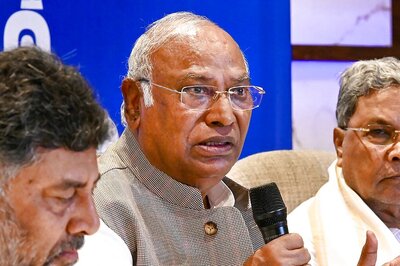
views
New Delhi: In what may be considered a landmark judgement, the Bombay High Court on Thursday upheld the validity of reservation granted to the Maratha community in government jobs and education.
The Maharashtra Act referred to as the Socially and Educationally Backward Classes (SEBC) Act, 2018 passed by the State Assembly on November 29, 2018 granted 16 per cent reservation for Marathas. But the Court ruled that reservation should not exceed 12 per cent in government jobs and 13 per cent in education as recommended by the Gaikwad Commission.
In its judgement, the court ruled in favour of reservation mainly focusing on the legitimate social and educational backwardness and inadequacy of representation of the community in public employment and thus the constitutional validity of the SEBC Act, 2018. Only “if the first question is answered in the affirmative, then only the second question would arise,” the Court said.
In January 2019, the Maharashtra State Backward Class Commission (MSBCC), headed by Justice MG Gaikwad, had taken note of several factors before recommending 16 per cent reservation for the Maratha community.
The judgement says that the Gaikwad Commission conducted “a detailed study of the said community in the backdrop of the public employment sector, education sector, social and economic status of the community, ratio of the population of the Maratha community, living condition of the community” to quantifiably reflect their backwardness and inadequacy in representation.
It also noted, quoting previous judgements, that the Supreme Court holds the appointed authority, in this case the Gaikwad Commission, “to identify the backward class of citizens to adopt such approach and procedure as it thinks appropriate”.
To establish the validity of the SEBC Act, the Court in turn cited the Gaikwad Commission report which “arrived at a conclusion that the persons belonging to Maratha community below creamy layer needs special help to advance further in the contemporary period so that they can move to a stage of equality with advance sections of the society, wherefrom they can progress and proceed”.
Advocate Sanjeet Shukla, who was the main petitioner in the case, however, offered another version of the Gaikwad Commission report.
Speaking to News18, he said, “What the Gaikwad Commission did was entirely change the system. It created its own point system. They justified that Marathas belong to an extraordinary category via a system devised by themselves and declared that reservation should be given”.
According to the Commission’s report, out of total 25 marks, 10 marks were allotted to Maratha community for social backwardness, 8 marks for educational backwardness and 7 marks for economic backwardness. The Marathas were considered backward for obtaining 12.5 marks, which is more than 50% of the total.
Shukla added that the Commission did not compare the Marathas with other castes to determine the need of reservation. “Marathas were compared to an OBC category community called the Kunbi. The rationale of seeking reservation for the Marathas was that the Kunbi were also entitled to it”.
Besides the point system, the main petitioner alleged that one of the 11 members of the Gaikwad Commission was biased towards his vote for reservation. “Out of the 6 who voted in favour, one-member Dr Sarate had filed a petition in the Bombay High Court favouring Maratha reservation. As a Commission member, he was not neutral, he was biased.”
Shukla also raised an objection to the reservation saying that it violates the 102nd Amendment according to which any reservation policy must be consented and gazetted by the President of India.
The Court in its judgement offered clarification to this argument by saying, “The backwardness of a class/community can be better understood by taking into consideration the prevailing factors by the State itself and when it comes to exercise of the enabling power who can be better positioned than the State to ascertain as to what steps are necessary for advancement of this class or to be subjectively satisfied that this class is not adequately represented in its State”.
“When this power has been construed as a discretion vested in the State, in that contingency, the identification of the beneficiaries of this class is better left to the State, and therefore, in our considered view, the amendment conferring a constitutional status on the National Backward Class Commission would not materially affect the power of the States to recognize such class and exercise its enabling power,” it added.
The Maratha reservation issue, soon after it came into effect, had drawn the ire of several other communities. The Akhil Bharatiya Brahman Mahasangh said Brahmins in Maharashtra was also backward and full time working priests only had earning opportunities for 120 days in the year. It infuriated Dalits as well.
The Bombay High Court also put to test whether the SEBC Act maintains equality before law by satisfying the principles of Article 14 and whether an extraordinary situation exists to allow exceeding the 50 per cent ceiling on reservation.
The judgement ruled that equality before law is maintained “by placing this class by applying the principle of equality on par with the other backward classes but on account of its distinctive character of not being conferred with the benefit for more than last six decades and since it is not conferred with any political reservation, form a separate class, not adequately represented in services under the State”.
As a precursor to its rationale, the Court, however, noted, “The affirmative action of the State, though apparently appear to be discriminatory is in reality aimed at attaining equality by eliminating the de facto inequality”.
However, the Gaikwad Commission “carved out an extraordinary situation and exceptional circumstances recommend to include the community in a separate category without touching the existing reservation,” the ruling further said.
On the 50 per cent ceiling, Court stated that the existing law, in effect of the 1993 Indra Sawhney judgement, if read in its “proper perspective” does not impose any “fetter on State’s powers to exceed reservation more than 50 per cent in a deserving case”.
News18 spoke to Shreehari Aney, former Advocate General of Maharashtra, to understand what the judgement can spell. He said the Court’s ruling would be accepted at the cost of a divided society.
“Maharashtra does not have a violent societal profile. So I don’t expect street agitations will happen after this judgement. But, the impact of the judgement will be somewhat diluted in terms of agitation because there was no stay granted when the Act came in. As a result, the government had actually been proceeding with making seats available for students under the new reservation order,” he said.
He added, “People have already reconciled to it in education. So far as the impact of reservation in jobs is concerned, it will now be felt.”
According to Aney, in Western Maharashtra, the affluent do not depend heavily on government jobs. But in the poorer regions of Maharashtra like Marathwada, Vidharba the impact will be felt in terms of jobs because not many Maratha’s live there.
“Whatever is the affect or impact of this judgement, it will not be felt in the short term. However, its long term consequences will be devastating because it permits segregation of society on the basis of legislative action,” said the former Advocate General of Maharashtra.
“And if the court has upheld that such legislation is possible then it means that you can introduce another legislation for another caste. Rather than deal with it as a part of an existing structure, the creation of additional castes is way open and that’s disturbing,” he added.
The petitioners of the case told News18 that they will take immediate action on the judgement and will appeal to the Supreme Court by next week.




















Comments
0 comment